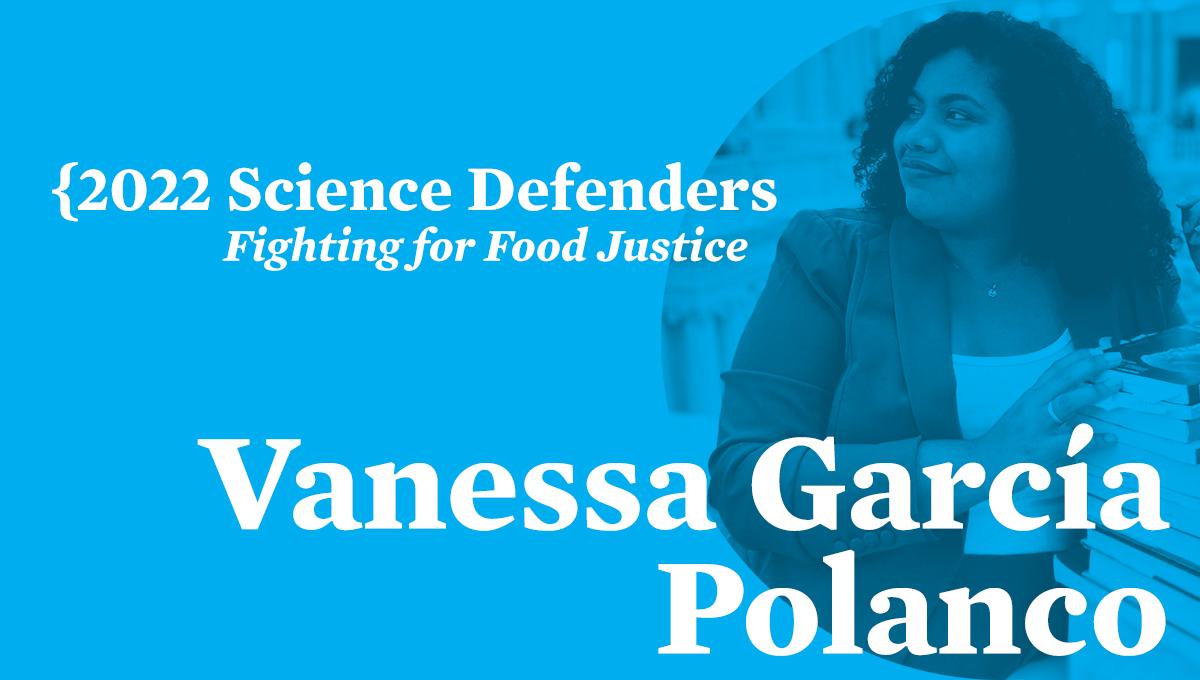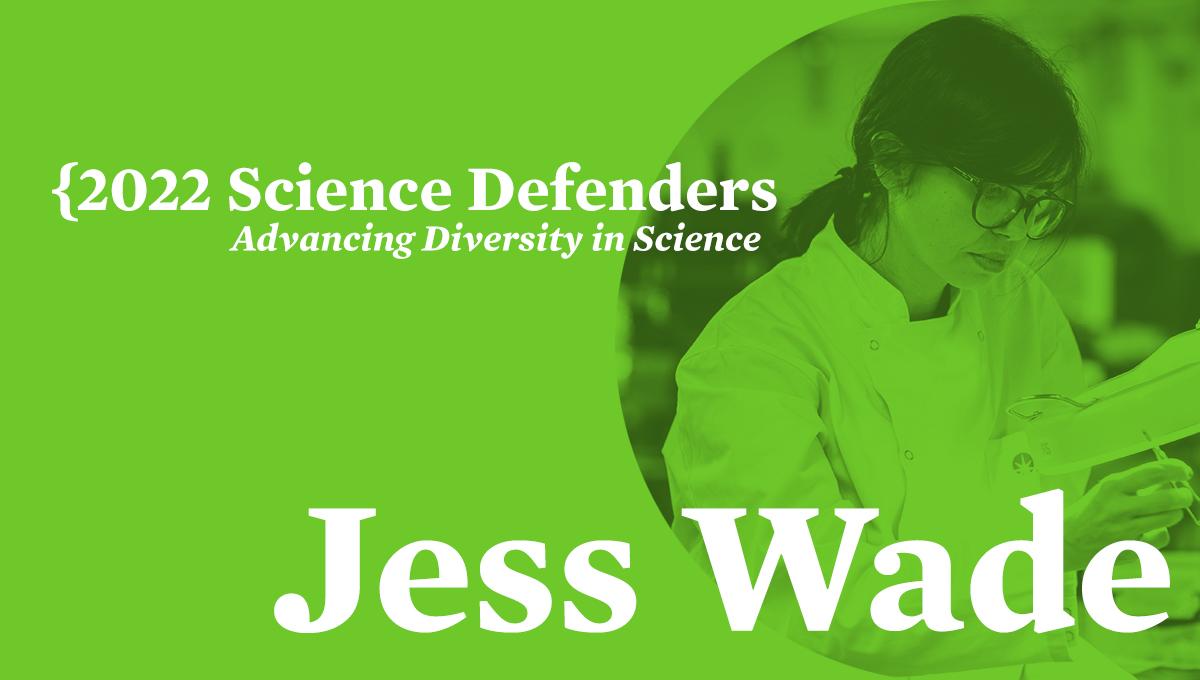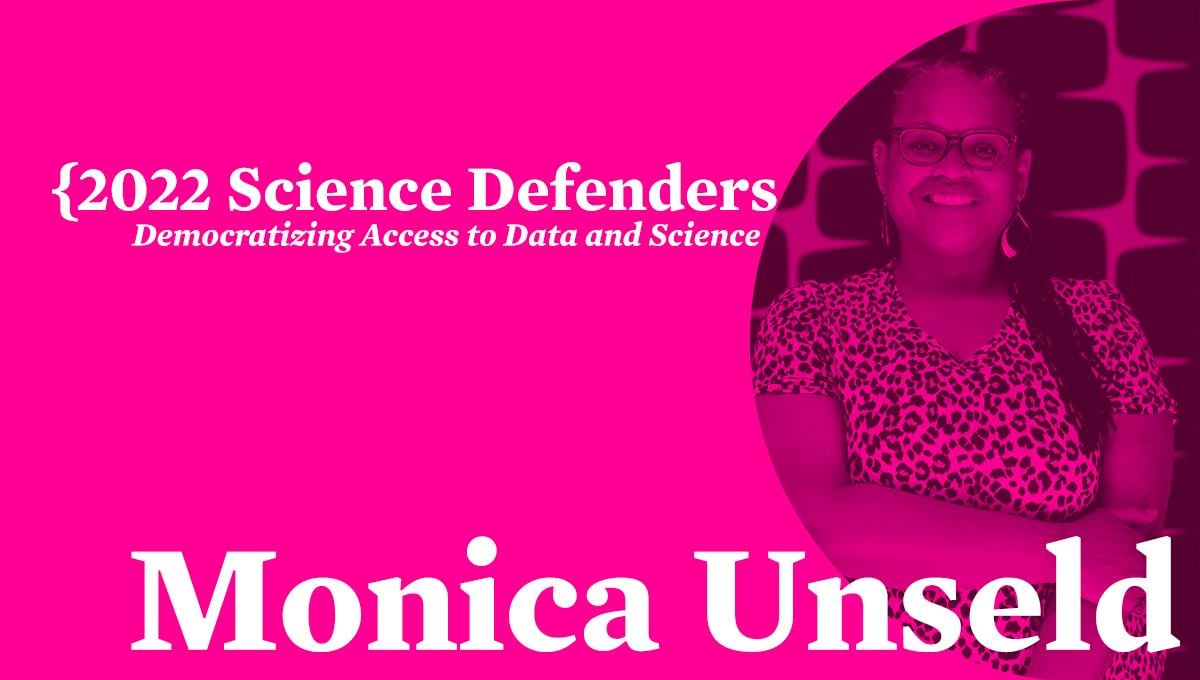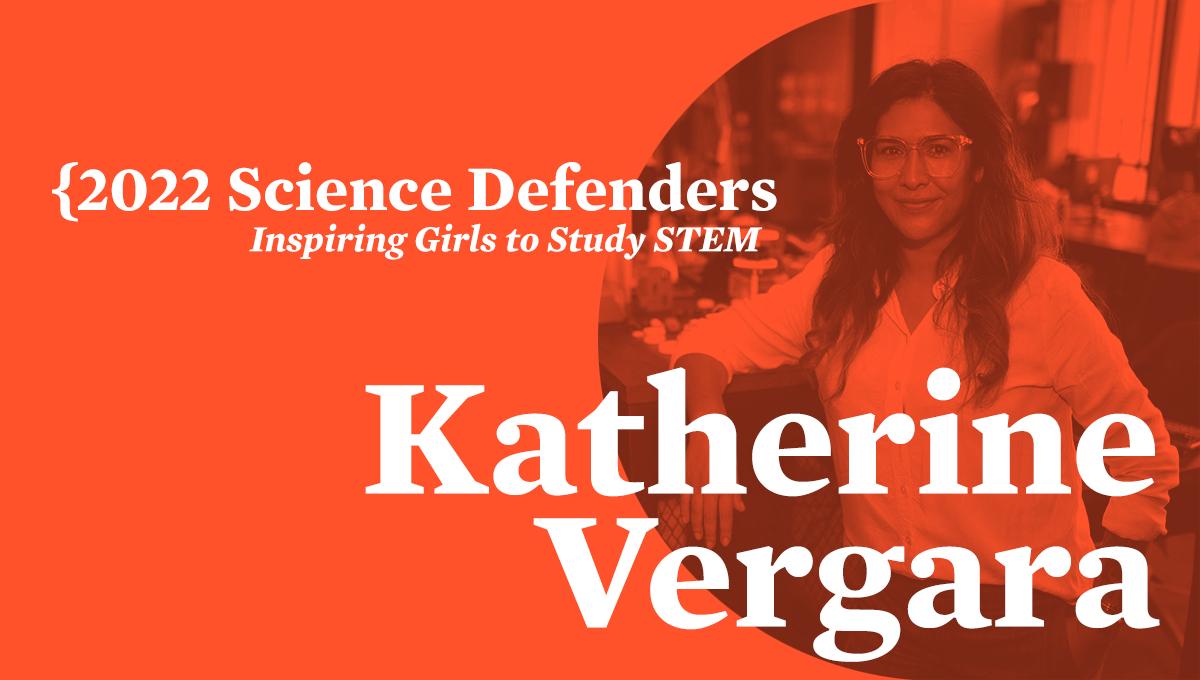At the end of every year, the Union of Concerned Scientists celebrates a few individuals (and occasionally groups) who have done something outstanding to defend science, and/or used science in some way to help people and change the world for the better. This year’s four Science Defenders more than meet these criteria. We are pleased to present them.

Vanessa García Polanco: Fighting for Food Justice
When Vanessa García Polanco’s family emigrated from the Dominican Republic to the United States, everything in her world changed—except, she says, for the food she ate. “It was the only thing that made sense to me. Food became my litmus test, my lens to understand society,” she says. This early foundation led to a master’s degree in community food and agricultural systems, and to her role as co-director of policy campaigns with the National Young Farmers Coalition, a nonprofit working to transform our agricultural system to benefit the land, the environment, and workers. García Polanco also created the campaign #FoodIsNeverJustFood, a toolkit that trains young people, immigrants, refugees, and people of color how to get involved in local food-centered movements, and maintains weekly conversations on social media using the tag #FoodJusticeFridays.
As a Dominican immigrant working on US food policy, García Polanco is especially aware of the power dynamics at play in our food system—and how our perceptions of farmers and food producers differ from reality. “Most food and agriculture workers look like me,” she says, “across the food supply chain, from the fields to food processing to stores, working in bad labor conditions.” Through the Young Farmers Coalition and her own work, she seeks to change these perceptions and dynamics, advocating for the right to land for young farmers and farmers of color. “We’ve created a pervasive and limiting idea of who gets to be a farmer in this country,” she says, “And [if we don’t change it] every policy is going to be for that person, not for the people who are actually feeding our communities.”
García Polanco points to the urgency of getting younger people on farmland, as the steady retirement of today’s farmers this decade will leave land open for further consolidation by agribusiness—resulting, she says, in higher food prices. “We’re ceding control of how we feed ourselves to corporations, to conglomerates, and billionaires,” she says. In the meantime, she fights for young people, and/or people of color to be able to break this cycle and reclaim their connections to land. “Being involved in agriculture allows me to stay connected to my Dominican origins, to my dad, who is still a farmer,” she says. “People of color have been exploited: as farmworkers, as enslaved people. We need to change that relationship to one that is dignified and cultivates the next generation in a more symbiotic way towards food production.”

Dr. Jess Wade: Advancing Diversity in Science
When Dr. Jess Wade started her academic career as a physicist, she looked around during her first lecture and noticed she was swimming in a sea of mostly white men. That trend continued to be true in her professional life—keynote speakers, award recipients, and celebrated scientists she encountered were seldom women or people of color. In reality, women and people of color are some of the most accomplished contributors to scientific discovery and innovation. Wade has made it her mission to get those scientists the recognition and opportunities they deserve.
Since 2017, Wade has published over 1,750 Wikipedia pages about women scientists and scientists of color. She sees the highly trafficked crowd-sourced platform as a powerful way to uplift the work of individuals who would otherwise be left out of the history books. Before Wade made a Wikipedia page for mathematician Dr. Gladys West, for example, West’s legacy was confined to a seven-second clip buried on the internet even though she was one of the masterminds behind the mathematical modeling of the shape of the Earth and the satellite geodesy models used in the Global Positioning System (GPS). Now West is celebrated as a BBC 100 Women, a member of the Space and Missiles Pioneers Hall of Fame, a Prince Philip Medal recipient, and was profiled in The Guardian.
Thanks in part to Wade and the other editors she’s trained to upload biographies, the percentage of English Wikipedia pages about women scientists has increased from approximately 17 to 19 percent in the past three years, which is more than 75,000 new biographies.
Wade says, “I never want to ‘other’ anyone else and I also never want to put the responsibility on anyone for advocating for the historically excluded group that they’re from.”
Thanks to the work of people like Wade, meaningful progress is being made to correct gender and racial biases that abound in science. The growing recognition and visibility for women and people of color is helping bring more diversity and integrity in scientific advancements across the world.

Dr. Monica Unseld: Democratizing Access to Data and Science
Dr. Monica Unseld serves as executive director of Until Justice Data Partners, the nonprofit she founded whose name suggests an end in sight to the critical work she and her partners carry out. Indeed, she’d love to go out of business. “My goal is to shut my nonprofit down,” she says. Unseld works to democratize access to science and data for regular people seeking justice—environmental justice, housing justice, or holding powerful people accountable for their abuses. She began her career as a professor of biology but pivoted to activism after the Deepwater Horizon BP oil spill in 2010. “I felt strongly that this was science in real life, and we had to meet that moment,” she says.
Using the expertise she gained from her training as a scientist with advanced degrees in biology and public health, she now shares her know-how with her community in Louisville, KY, and beyond. “What's really useful to my community right now are my research skills”—which, she says, shouldn’t be gatekept among academics, or weaponized against people. Instead, she builds bridges. For example, after hearing anecdotes about tear gas exposure and menstrual cycle disruption, she helped launch a formal study at the University of Louisville on the possible links.
“I try to show people how data fits in their daily lives, and make it as accessible and easy as possible,” she says. “People discover that they already know much more about the situation than they think they know.”
Unseld says she’s proudest of normalizing the use of data in her community, be it a statistic on a protest sign that sends the media to follow up on the story behind it, or an evidence-backed challenge to the official version of events—e.g., the Louisville Police Department’s initial account of the murder of Breonna Taylor. “Scientists have this insider knowledge into how the universe works, and we don't even freely share the information with ourselves,” Unseld says. “But that model has never served us. Science needs to be what society needs it to be.”

Katherine Vergara: Inspiring Girls to Study STEM
Kathy Vergara is working on a doctorate in computer science at Pontificia Universidad Católica, in Santiago, Chile. She’s the founder of an independent video game studio, and is leading a team of female programmers to release a proprietary game in 2023. And in her spare time, she’s @STEMtivista on TikTok, Instagram, and Twitter, creating short videos on science, technology, engineering, and math (STEM) to engage young people—girls and young women especially—and encourage them to study these fields. On TikTok, where she has thousands of followers, Vergara uses simple language to explain concepts including machine learning, wearables, and artificial intelligence, and provides tips for students hoping to get into STEM fields. “Information is power,” she says. “And we as scientists have this power. It’s important for me to give it back to people.”
Vergara is especially passionate about digital literacy. “I started to feel like people don't really understand the impact of technology in their lives—for example, issues like password safety, or being able to spot disinformation. Those of us who do, we have a duty to help people make better decisions,” she says. She began making videos to reach a wider, younger audience, overcoming her reluctance to appear on camera. “I’m always telling girls that they have to get out of their comfort zone to achieve their goals and dreams,” she says, “so I have to do the same."
Of her drive to bring more girls and young women into STEM, Vergara says it’s a personal commitment. “I want all the girls in my country, and in Latin America generally, living in low-income areas, to see the opportunity to create a career in technology and help themselves and their families break out of poverty,” she says. Vergara has firsthand experience with this phenomenon; her father’s study in STEM fields when she was a child helped him find a job that allowed her family to move from the impoverished community she was raised in, and funded her university education. “My life could have been so different,” she says. “So, I want to leave the world better than I found it.”